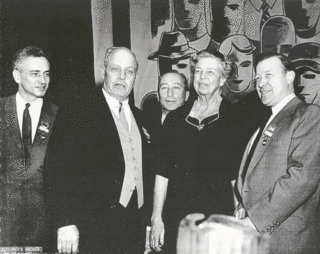
The breakup of the American labor movement begins Monday. SEIU, the largest and fastest growing union in the federation has announced that it will be leaving the AFL-CIO. Many of their partners in the Change to Win coalition have made similar noises, meaning that unions representing 1/3 of the organized labor force in the United States are likely to disaffiliate. This is a disaster.
There is a lot to be liked about SEIU’s criticisms of the AFL-CIO. Labor should focus on core industries, should rebate funds to affiliates for organizing, should target particular employers or sectors with coordinated campaigns. Their arguments are important enough, however, that they should actually work to win them, and not simply leave the table when they don’t get their way. “Take my toys and go home” is one way that many trade unionists have characterized the move.
SEIU’s claims every effort was made to push for reform before the decision was made to bolt. There may be some truth to this. I’ve known and worked with too many good SEIU folks to think that they are simply lying. However, there is a lot to be suspicious about. I have labor friends who see the entire affair as a cynical power-grab. SEIU stands to gain a lot from a consolidation of the labor movement into large industrial unions. It would be a member (and dues) bonanza for them.
On the surface, at least, the argument revolves around a very real and very difficult dilemma for American labor. On the one hand, labor is losing a potentially deadly fight in the policy arena. Laws are being passed which make it harder to organize workers, and the meager welfare state which is crucial to labor’s goals is on the chopping block. Both of these trends have existed since Nixon, including under two Democrats, but they have accelerated dramatically. This is life or death. Putting serious resources into ending the Republican era is a necessity.
On the other, you can’t build political power if you are not organizing, if you are not growing your base, winning back some strategic economic leverage and enlarging the community of voters who are likely to vote progressive. The fortunes of the Democratic Party are tied inexorably to the fortunes of the labor movement. As labor falls, Democrats fall with them. Rebuilding the labor movement is crucial for any hope of a Democratic revival. SEIU has made this second argument. The public sector and “old” industrial unions which oppose them have made the first. They are both right.
I hate to sound like one of those annoying “third position” types, but there really is a third position here. The right kind of political mobilization is organizing, and vice-versa. Instead of simply making large donations to candidates, slice off some (not all) of that money and put it into on-the-ground organizing. You can make strategic, even political decisions about where and who to organize. Instead of just pumping millions into a swing state, pick Ohio as the state to start the Walmart campaign and make it clear that support for the drive is the key to getting labor money and troops.
SEIU wants to concentrate on organizing at the radical expense of political spending. SEIU model of slash and burn growth gets results. However, if Bush appointees continue to run the NLRB as they have, it may be impossible to organize anyone, anywhere. Some may argue that the early victories of the CIO were won through brute organizing strength without legal protection. However, people forget that the structure of the economy as well as the political/ideological winds were all on our side in the 1930’s. They aren’t anymore.
Today’s situation is much more like the 1980’s, when Reaganite political action did far more devastated the power of the labor movement. On top of Reagan’s attacks, the manufacturing sector was decimated by poor policy and the expansion of imports. Today, outsourcing and a viciously anti-labor White House makes the environment for organizing quite difficult. A little ease-up on one of these fronts would be tremendous. We have to do both organizing and political work, and we should seek to break-down the dichotomy between them.
A compounding problem, of course, is the failure of the Democratic Party to treat labor as more than an ATM machine. If Democrats at the state and Federal level led a party that espoused a coherent, progressive-populist economic agenda, it would make labor’s job a lot easier. If Democrats in Congress would hold the line on labor’s interests, we could have scored some legislative victories (at least holding victories) utilizing labor clout in Republican-led swing districts. Their inability to lead is part of the reason labor is weak- and it is in weakness that destructive internal battles occur.
Frankly, for me, a lowly local labor activist, this is something like watching your parents get divorced. You sympathize with both of them all the while sensing a certain childishness on their part for not being able to work it out.
For good analysis of the labor divorce, I suggest reading coverage by David Moberg and Harold Meyerson. Meyerson and Moberg put the split into a broad political context, and focus on the consequences for the Demcoratic Party (Meyerson) and the left in general (Moberg). Some may point toward Kim Moody and his journal Labor Notes, but despite their rigor and attention to detail, I find their analysis goofy. Here is Moody quoted in a long Trotskyist analysis of the split. It's near the end. Yikes.
Some other links:
Black trade unionists against SEIU proposal
Labor Notes index of coverage of split
Change to Win
AFSCME and CWA websites have some good rebuttals.








